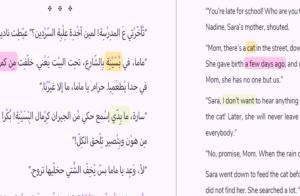
Key Egyptian Arabic Expression: كِده kida
كِده is likely the most quintessentially Egyptian word there is. Not only is it very high frequency in everyday speech, but it is unique to the Egyptian Arabic dialect. كِده is related to the Modern Standard Arabic word هكذا like this but takes on a range of idiomatic meanings on its own and in phrases.

Egyptian Arabic as a Written Language
Ahmad tells us about the barriers of diglossia in the Arabic-speaking world and how Egyptian Arabic is gaining ground as a written language.

Reading Activities for Arabic as a Second Language
How to use the parallel translations and audio to study with Arabic readers effectively.

Learning New Vocabulary While Reading Arabic
Develop strategies and adopt a productive mindset for dealing with new vocabulary while reading Arabic as a second language.

Is Extensive Reading in Arabic Important?
Learn why extensive reading in Arabic is so important and how to implement it in your learning routine.

Unit 1: Egypt is the Number One Country to Visit for 2020
Let’s take a look at Unit 1 from the book The News in Egyptian Arabic.

Egyptian Arabic Pronunciation
Learn how to pronounce Egyptian Arabic and about the sound changes that distinguish it from other varieties of Arabic.

Is Modern Standard Arabic Difficult for Arabs?
Part 7 in the “Arabs Say…” series, we ask: How proficient are you in Modern Standard Arabic (MSA)? What is difficult for you? Do you make any mistakes?

Egyptian Arabic Song: Zay Manty (Amr Diab)
Learn Egyptian Arabic with Amr Diab’s Zay Manty (video, English translation, and language notes).

Unique Words in Arabic Dialects that Even Other Arabs May Not Understand
Part 6 in the “Arabs Say…” series, we ask: What are a few words that are unique to your dialect which Arabs from other countries might find amusing or not understand?

Learn Arabic with Netflix
How to use Netflix to learn Arabic–searching and subtitle hacks.

Let’s Compare the Advantages and Disadvantages of Using a Dialect with Modern Standard Arabic
Part 5 in the “Arabs Say…” series: What are the advantages of using your local dialect over MSA? And what are the disadvantages?
